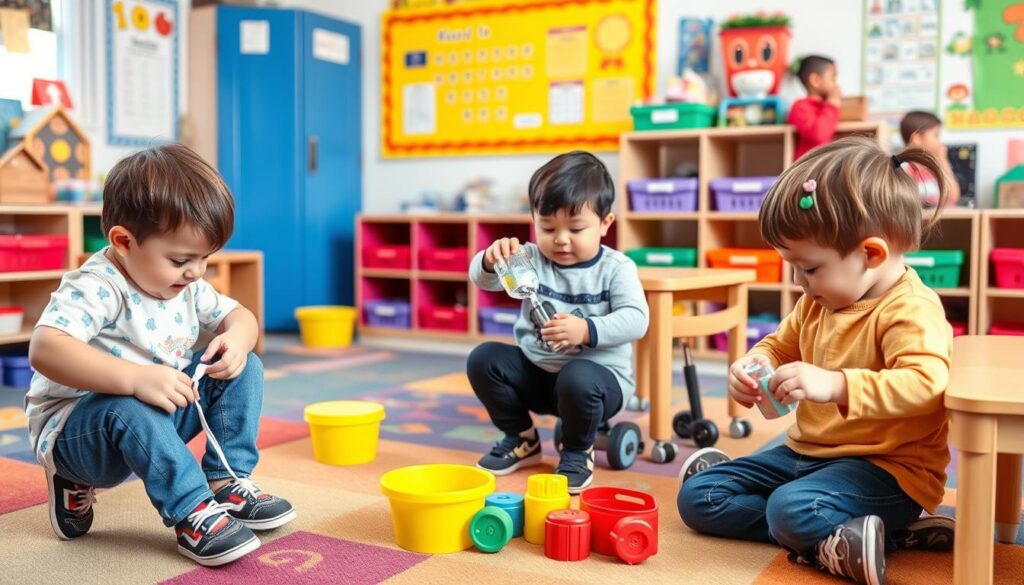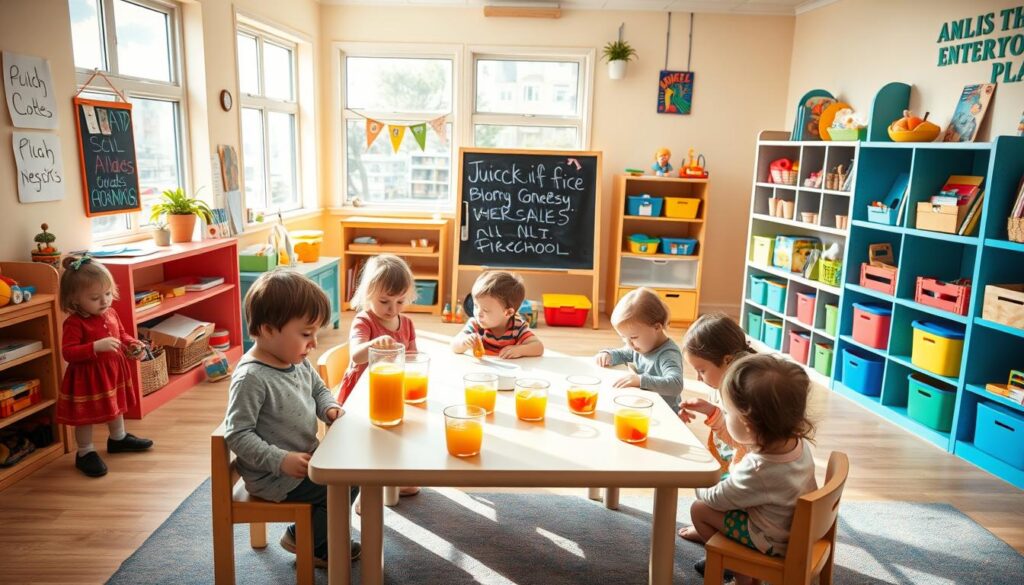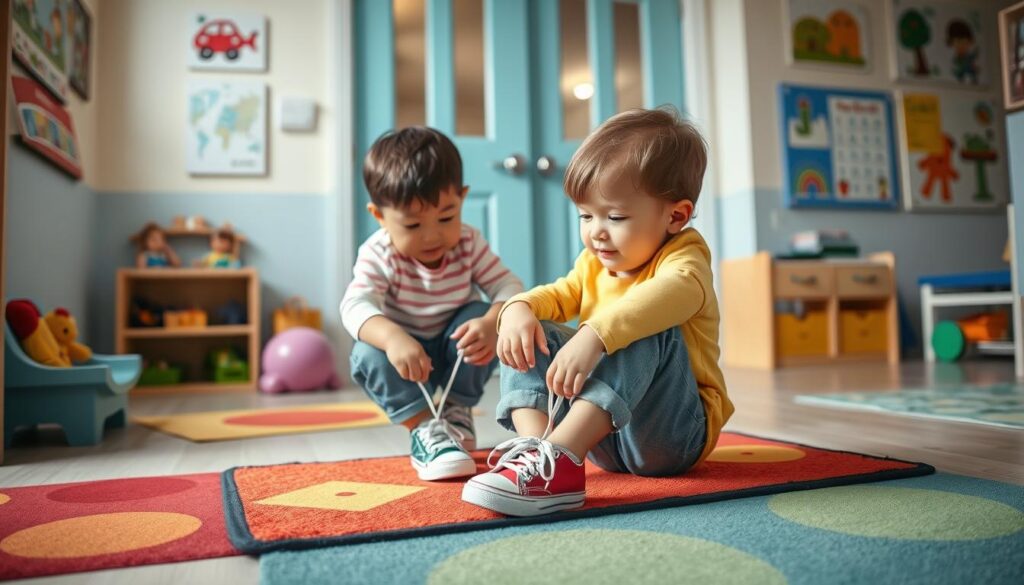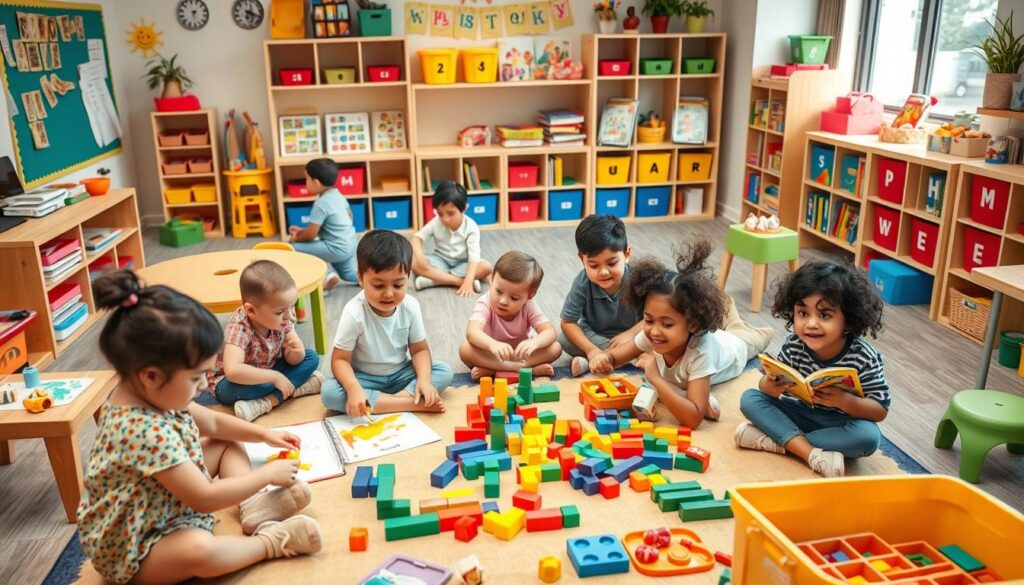Have you ever thought about how to make your child more self-sufficient and confident? Teaching preschoolers to be independent is key to their growth. It begins with you. By learning how to foster independence, you can help your child develop important skills like problem-solving and decision-making.
With the right guidance, you can encourage your child to become more independent and self-reliant. This is a great way to support their development.
Understanding the value of independence is the first step. It equips your child with the skills needed to succeed. While it may seem tough, with the right advice, you can help your child thrive. Teaching independence helps your child develop a strong sense of self and become confident and capable.
Key Takeaways
- Learning how to foster independence in preschoolers is essential for their development
- Fostering independence helps children develop essential life skills, such as problem-solving and decision-making
- Providing tips for parents can help encourage independence in preschoolers
- Fostering independence is key to helping your child develop self-reliance and confidence
- By learning how to foster independence in preschoolers, you can help your child become a capable and confident individual
- Fostering independence in preschoolers can be challenging, but with the right tips for parents, you can help your child succeed
Understanding the Importance of Independence in Early Childhood
As a parent, you are key in shaping your child’s preschooler development and encouraging independence. Promoting independence is vital in early childhood. It helps children become self-reliant and confident. By creating a supportive space, you help your child explore, learn, and grow. This building self-reliance will benefit them for life.
Studies show that independence is essential for a child’s growth. In early childhood, kids start to show their independence by making choices and taking risks. As a parent, it’s important to offer a nurturing space for exploration and learning. At the same time, you must set boundaries to keep your child safe and sound.
- Asserting independence through simple actions, such as dressing and feeding themselves
- Showing interest in taking care of themselves and their belongings
- Developing problem-solving skills and learning to make decisions
By promoting independence and building self-reliance, you help your child gain the skills and confidence needed for success. Create a supportive environment, establish clear rules, and encourage exploration and learning. This way, you’ll raise a confident, independent, and self-reliant person.
Creating a Safe Environment for Independent Exploration
As a parent, you are key in raising independent kids. You create a safe space for them to explore and learn. This space is vital for preschoolers to make choices, take risks, and solve problems. With parent support for independence, your child will grow more confident and self-reliant.
To make a safe space, focus on these important points:
- Establish a stable and predictable routine
- Encourage exploration and play
- Set clear boundaries and expectations
- Provide opportunities for children to make choices and take risks
These steps help your child feel independent and self-reliant. Remember, raising independent kids means finding the right balance. With parent support for independence, your child will grow and learn important life skills.

Creating a safe and supportive environment empowers your child to be confident and independent. This helps them face life’s challenges and develop self-reliance. As a parent, your role in raising independent kids is essential. By providing the right environment, you set your child up for success.
Essential Life Skills to Teach Your Preschooler
Teaching your preschooler life skills is key to promoting early childhood independence. These skills help your child become self-sufficient and boost their confidence. By starting early, you’re setting the stage for a strong, independent person.
Focus on self-care skills like dressing and feeding. Let your child dress themselves, even if it takes longer. Encourage them to feed themselves during meals. Also, teach them basic household tasks like cleaning up toys and helping with laundry. These tasks help them feel responsible and contribute to the household.
Self-Care Skills
- Dressing and undressing
- Feeding themselves
- Using the bathroom independently
Basic Household Tasks
- Cleaning up toys and books
- Helping with laundry
- Assisting with simple meal preparation

Teaching your preschooler these life skills promotes autonomy and independence. Be patient and supportive as they learn. It may take time for them to master these skills.
Developing Daily Routines That Promote Self-Reliance
Creating a daily routine is key to teaching preschoolers to be independent. A routine gives kids a sense of what to expect, which is important for growing up. It lets them try new things, make choices, and learn from mistakes.
Here are some tips for setting up daily routines:
- Set a regular sleep schedule to keep your child well-rested and alert
- Encourage your child to dress themselves and do simple self-care tasks
- Give your child choices, like what to wear or what to eat for breakfast
Fostering independence takes time, patience, and positive feedback. By following these tips, you can help your child grow more confident and self-sufficient. This will help them succeed in many areas of life.

It’s important to find a balance between structure and flexibility in daily routines. This balance helps your child feel responsible and independent. It also lets them make mistakes and learn from them. As you work on teaching independence, remember that every child is different. Tailor your approach to fit their unique needs and personality.
| Daily Routine | Activity | Benefits |
|---|---|---|
| Morning | Getting dressed | Encourages self-reliance and independence |
| Afternoon | Completing simple tasks | Develops problem-solving skills and responsibility |
| Evening | Establishing a bedtime routine | Helps develop a sense of predictability and stability |
How to Foster Independence in Preschoolers Through Play
As a parent, play is a great way to help your preschooler become more independent. Giving them chances to play alone helps them solve problems and feel self-reliant. You can offer puzzles, games, and building blocks to encourage this.
It’s important to balance structured and unstructured play. Arts and crafts help with fine motor skills and creativity. Free play lets your child make choices and learn to entertain themselves. This mix helps them feel more in control and confident.
Independent Play Activities
- Puzzles and games to develop problem-solving skills
- Building blocks and construction toys to promote fine motor skills and creativity
- Dress-up and pretend play to encourage imagination and role-playing
Adding these play activities to your child’s day helps them grow more independent. Always watch over them and guide when needed. But also let them make choices and learn from mistakes. This way, you help them build a strong sense of independence and self-reliance.
| Play Activity | Benefits |
|---|---|
| Puzzles and games | Develops problem-solving skills and self-reliance |
| Building blocks and construction toys | Promotes fine motor skills and creativity |
| Dress-up and pretend play | Encourages imagination and role-playing |
Building Decision-Making Skills in Young Children
As a parent, you have a big role in building self-reliance in your child. Encouraging decision-making from a young age is key. By letting your child choose, you help them think critically and solve problems. For example, asking them what to wear or eat for breakfast can boost their confidence.
Raising independent kids needs patience, consistency, and positive feedback. Start by giving your child a few choices and add more as they grow. Remember, building self-reliance takes time, effort, and dedication.
Here are some ways to boost decision-making skills in young children:
- Give them choices, like which game to play or book to read.
- Encourage them to share their opinions and thoughts.
- Show them good decision-making by being a role model.
By raising independent kids who can make smart choices, you equip them for life’s challenges. Always be supportive and encouraging, even when they make mistakes. With practice, your child will grow into a confident, self-reliant person.

Managing Common Challenges and Setbacks
As a parent, you are key in helping your preschooler become independent. Giving support for independence is vital. But, you might face challenges and setbacks. It’s important to handle these well to help your child grow.
Teaching children to be independent needs patience and consistency. If your child resists or throws tantrums, stay calm. Try to find out why they’re upset and help them. This way, you support them while encouraging independence.
Dealing with Resistance
Resistance is a common issue when teaching children to be independent. Try breaking tasks into smaller steps. This makes your child feel more in control. Also, giving them choices and letting them help with decisions can reduce resistance.

Balancing Support and Independence
Finding the right balance between support and independence is key. You want your child to make choices and learn from mistakes. But, you also need to make sure they’re safe. Setting clear rules helps your child feel responsible and self-reliant.
Teaching preschoolers to be independent takes time and effort. By supporting their independence, you help them develop important life skills. These skills will benefit them for years to come.
Supporting Emotional Independence
Supporting your child’s emotional independence is key. Create a caring space where they can express themselves and manage their feelings. This helps them deal with early childhood challenges.
Emotional independence is vital for preschoolers. Feeling safe and supported lets them explore and grow. Encourage them to share their feelings and teach them to cope.
Building Self-Confidence
Building self-confidence is important. Praise your child’s efforts and let them make choices. This makes them more resilient and ready for challenges.
Managing Separation Anxiety
Separation anxiety is common. Have a consistent goodbye routine and reassure your child. Let them share their feelings to help them cope.

Developing Emotional Regulation
Teaching emotional regulation is essential. Help your child understand and manage their feelings. Activities like deep breathing and talking about feelings can help.
Supporting emotional independence helps your child thrive. Be patient and consistent. Your child will grow emotionally strong and succeed in life.
Communication Strategies That Encourage Autonomy
Communication is key when fostering independence in preschoolers. As a parent, using positive words, listening well, and asking open questions helps. These actions help kids feel more independent and self-reliant. To how to foster independence in preschoolers, give them choices and let them help make decisions.
Here are some tips for parents to encourage autonomy in their preschoolers:
- Use positive language to encourage independence
- Practice active listening to understand their needs and concerns
- Ask open-ended questions to promote critical thinking and problem-solving
By using these communication strategies, you can help your child feel more independent. Remember, tips for parents vary for each child. Be patient and adjust your methods as needed. With time and effort, your child will grow into a confident, independent person.

As you work on how to foster independence in preschoolers, remember each child is different. Be flexible and open to trying new things. With the right communication and support, your child will thrive and develop important skills.
| Communication Strategy | Benefits |
|---|---|
| Positive Language | Encourages independence and self-reliance |
| Active Listening | Helps understand child’s needs and concerns |
| Open-Ended Questions | Promotes critical thinking and problem-solving |
Conclusion: Empowering Your Preschooler’s Journey to Independence
Starting your preschooler’s journey to independence is a slow process. Create a caring space, encourage them to explore, and teach them important life skills. This way, you help them grow into a confident and self-sufficient person. Enjoy the journey and celebrate every step of their growth.
By following the tips in this article, you can help your child become more independent. Your role is to support and trust their need for freedom. This will help them develop the skills they need to face the world with confidence.
